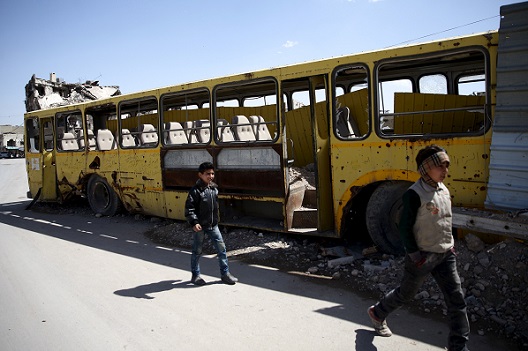 Moscow’s announcement that the “main part” of its combat contingent will withdraw from Syria is interesting and potentially positive. Yet it must be treated with caution. What will be withdrawn? When? What will be left behind? What capabilities will reside in that which remains in Syria? Until these basic questions are answered the announcement, in and of itself, is without substantive meaning, leaving Moscow free to continue its air assaults on Syrian civilians and on rebel military units that have received arms and equipment from the United States and its partners.
Moscow’s announcement that the “main part” of its combat contingent will withdraw from Syria is interesting and potentially positive. Yet it must be treated with caution. What will be withdrawn? When? What will be left behind? What capabilities will reside in that which remains in Syria? Until these basic questions are answered the announcement, in and of itself, is without substantive meaning, leaving Moscow free to continue its air assaults on Syrian civilians and on rebel military units that have received arms and equipment from the United States and its partners.
What is very clear is that the combination of Russian air assaults and ground advances by Iranian-organized Shia foreign fighters have stabilized the regime of Bashar al-Assad in time for Geneva negotiations to resume. Indeed, Syria’s Foreign Minister has boasted that Assad and the Syrian presidency will not be the subject of peace talks: a clear rejection of the 2012 Geneva Final Communique, which is the basis for the talks. He would not be in a position to make such a statement absent Russian and Iranian military intervention. Indeed, Minister Walid al-Muallem stated quite pointedly that opposition negotiators would not gain in the conference room that which they failed to achieve on the field of battle. He has a point.
Russia’s six month offensive has in fact been quite effective in tilting the negotiating table hastily erected by Washington soon after the air assaults began. Although some observers hope to see in Moscow’s announcement a clear signal of Russian displeasure with Assad regime intransigence toward meaningful negotiations, the salient fact is that Russian intervention has left Assad impervious to demands in Geneva that he step aside in favor of a transitional governing body.
It goes without saying that a united Syrian front against the Islamic State (ISIL, ISIS, Daesh) is impossible under the auspices of Syria’s Barrel Bomber in Chief. Progress toward a new constitution and national elections is likewise blocked by the political salience of a family that has orchestrated a campaign of collective punishment and mass homicide against civilians. Reconstruction and reconciliation are simply not on with Bashar and his team in place. Yet Russian President Vladimir Putin sees Assad as the personification of a state: a state to be saved from what he describes as American regime change and democratization mania.
Putin probably calculates that drawn-out, inconclusive negotiations in Geneva increase the possibility that Washington will throw in the towel and agree to work with Assad for the sake of beating ISIL. If and when that happens—enabling Putin to proclaim victory to his domestic audience—Bashar al-Assad will slowly transform into a declining asset and perhaps even a liability in the eyes of Putin. This does not mean that Moscow would work to sideline its client. At that point, however, Assad’s survival will become what it was before September 30, 2015: principally the responsibility of Iran. And Tehran, knowing that Syria’s role as a tool for supporting Hezbollah has few Syrian adherents beyond the Assad regime, will work hard to keep the keystone of the regime—Bashar al-Assad—in place.
If a significant Russian drawdown proves to be real, it would confirm the obvious: that Moscow never intervened to fight ISIL. It might also signify Russia’s realization that a thrust toward southwest Syria could imperil the security of Jordan and perhaps bring Israel into the fight. On balance a sizeable drawdown could mean that Putin calculates he has gotten his maximum military bang for the buck in Syria, and that anything further would encounter diminishing returns.
Saving Assad from defeat and perhaps making him impervious to demands that he step aside are no small feats. And if this drawdown is real, Putin may be realizing that the revival of Cold War practices at a time of political transition in the United States is not the wisest of geostrategic moves.
Ideally, however, the West will not view a significant drawdown in Syria per se as a diminution of the threat to the peace posed by an aggressively militarist Russia. Ideally it is already too late for Mr. Putin to persuade President Obama’s successor and other Western leaders that he is a force for good in the world. If nothing else, the civilian slaughter he has commissioned in Syria makes it clear what he is and what he stands for.
Frederic C. Hof is a Resident Senior Fellow with the Atlantic Council’s Rafik Hariri Center for the Middle East.
Image: Photo: Boys walk past a damaged bus in the rebel-held Qaboun neighborhood of Damascus, Syria March 14, 2016. Picture taken March 14, 2016. REUTERS/Bassam Khabieh
